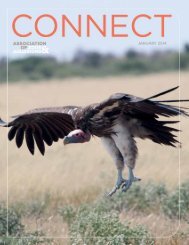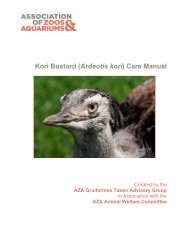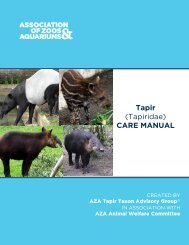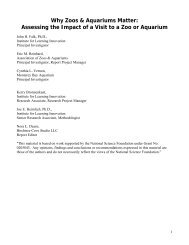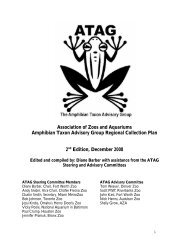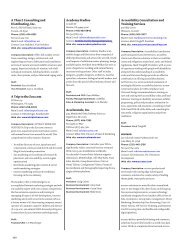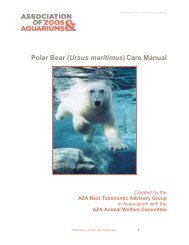Otter (Lutrinae) Care Manual - Association of Zoos and Aquariums
Otter (Lutrinae) Care Manual - Association of Zoos and Aquariums
Otter (Lutrinae) Care Manual - Association of Zoos and Aquariums
You also want an ePaper? Increase the reach of your titles
YUMPU automatically turns print PDFs into web optimized ePapers that Google loves.
<strong>Association</strong> <strong>of</strong> <strong>Zoos</strong> <strong>and</strong> <strong>Aquariums</strong> 114<br />
<strong>Otter</strong> (<strong>Lutrinae</strong>) <strong>Care</strong> <strong>Manual</strong><br />
• The numbers <strong>of</strong> trained personnel required to ensure the health <strong>and</strong> welfare <strong>of</strong> the animals,<br />
h<strong>and</strong>lers <strong>and</strong> public.<br />
• Taxon-specific guidelines on animal health.<br />
IX. Logistics, <strong>and</strong> Managing the Program: The Institutional Policy should address a number <strong>of</strong> logistical<br />
issues related to program animals, including:<br />
• Where <strong>and</strong> how the program animal collection will be housed, including any quarantine <strong>and</strong><br />
separation for animals used <strong>of</strong>f-site.<br />
• Procedures for requesting animals, including the approval process <strong>and</strong> decision making process.<br />
• Accurate documentation <strong>and</strong> availability <strong>of</strong> records, including procedures for documenting animal<br />
usage, animal behavior, <strong>and</strong> any other concerns that arise.<br />
X. Staff Training: Thorough training for all h<strong>and</strong>ling staff (keepers, educators, <strong>and</strong> volunteers, <strong>and</strong><br />
docents) is clearly critical. Staff training is such a large issue that many institutions may have separate<br />
training protocols <strong>and</strong> procedures. Specific training protocols can be included in the Institutional Program<br />
Animal Policy or reference can be made that a separate training protocol exists. It is recommended that<br />
the training section <strong>of</strong> the policy address:<br />
• Personnel authorized to h<strong>and</strong>le <strong>and</strong> present animals.<br />
• H<strong>and</strong>ling protocol during quarantine.<br />
• The process for training, qualifying <strong>and</strong> assessing h<strong>and</strong>lers including who is authorized to train<br />
h<strong>and</strong>lers.<br />
• The frequency <strong>of</strong> required re-training sessions for h<strong>and</strong>lers.<br />
• Personnel authorized to train animals <strong>and</strong> training protocols.<br />
• The process for addressing subst<strong>and</strong>ard performance <strong>and</strong> noncompliance with established<br />
procedures.<br />
• Medical testing <strong>and</strong> vaccinations required for h<strong>and</strong>lers (e.g., TB testing, tetanus shots, rabies<br />
vaccinations, routine fecal cultures, physical exams, etc.).<br />
• Training content (e.g., taxonomically specific protocols, natural history, relevant conservation<br />
education messages, presentation techniques, interpretive techniques).<br />
• Protocols to reduce disease transmission (e.g., zoonotic disease transmission, proper hygiene<br />
<strong>and</strong> h<strong>and</strong> washing requirements, as noted in AZA's Animal Contact Policy).<br />
• Procedures for reporting injuries to the animals, h<strong>and</strong>ling personnel or public.<br />
• Visitor management (e.g., ensuring visitors' interact appropriately with animals, do not eat or drink<br />
around the animal, etc.).<br />
XI. Review <strong>of</strong> Institutional Policies: All policies should be reviewed regularly. Accountability <strong>and</strong><br />
ramifications <strong>of</strong> policy violations should be addressed as well (e.g., retraining, revocation <strong>of</strong> h<strong>and</strong>ling<br />
privileges, etc.). Institutional policies should address how frequently the Program Animal Policy will be<br />
reviewed <strong>and</strong> revised, <strong>and</strong> how accountability will be maintained.<br />
XII. TAG <strong>and</strong> SSP Recommendations: Following development <strong>of</strong> taxon-specific recommendations from<br />
each TAG <strong>and</strong> SSP, the institution policy should include a statement regarding compliance with these<br />
recommendations. If the institution chooses not to follow these specific recommendations, a brief<br />
statement providing rationale is recommended.



